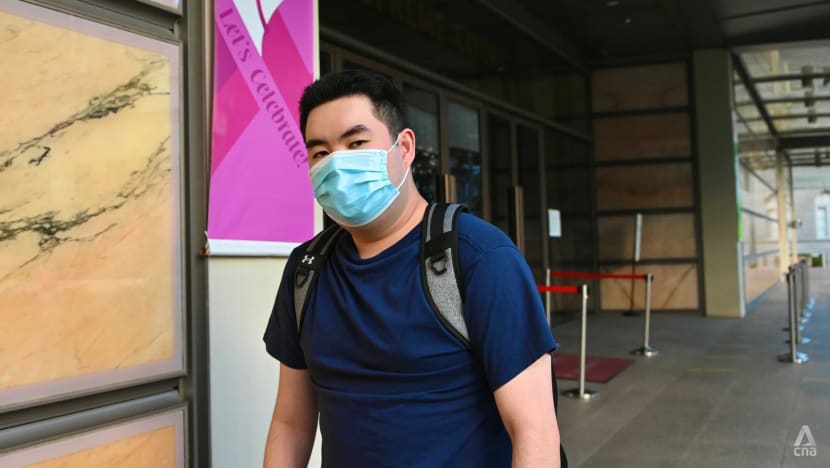Gag orders concerned with victims' interests only, never the accused: Chief Justice on voyeur case

Colin Chua Yi Jin is seen outside the Supreme Court on Sep 24, 2021. (Photo: Hanidah Amin)
SINGAPORE: Gag orders are concerned with only the interests of the victims, and never those of the accused person, the Chief Justice has reiterated in a judgment released on Friday (Dec 24).
Chief Justice Sundaresh Menon said this in the full grounds of a decision he made in September, which led to 23-year-old Colin Chua Yi Jin being named for the first time since he was charged in October 2019.
Chua pleaded guilty in July to seven charges of insulting the modesty of women and another charge of possessing obscene films.
He took videos up women's skirts and of victims in the shower from 2014 to 2015 when he was in junior college in Singapore, from 2016 to 2018 when he was a full-time national serviceman, and from October 2018 when he was studying at a university in the UK.
As the victims were Chua's classmates, schoolmates and friends, the gag order initially covered not only the victims' identities but also Chua's.
The prosecution pushed for the gag order on Chua's identity to be lifted, and the district court judge granted this, but the defence made an application to the High Court against it. Chief Justice Menon dismissed the application and lifted the gag order on Chua's identity in September.
WHAT HAPPENED WITH THE VICTIMS REGARDING THE GAG ORDER
In his grounds on Friday, the Chief Justice laid out the sequence of events: The gag order on the victims was imposed at Chua's first charging date in October 2019. The prosecutor did not object to the defence's request for Chua to be covered under the gag order at the time, as two victims were Chua's classmates and his identity would risk their identification.
As investigations were still ongoing, the prosecution considered also that disclosing Chua's identity at the time would risk identifying other victims who had not been named in any new charges.
By Jan 14, 2020, when the prosecution applied to vary the gag order and name Chua, 10 of the 12 identified victims were in favour to identify him. Of the two remaining victims, one had reservations, while the other was abroad and was not contacted in accordance with her family's wishes.
The district judge dismissed the prosecution's application to lift the gag order on Chua on the basis that the two victims had not consented to the risk of identification.
The 11th victim later changed her mind and supported disclosing Chua's identity, while the prosecution withdrew four charges such that there were no more charges involving the 12th victim.
Victim impact statements were taken from all 11 remaining victims, and they all agreed to lifting the gag order on Chua, even if it increased the risk of them being identified.
In his judgment, Chief Justice Menon expounded on the purpose of gag orders. First, they encourage witnesses and victims to testify candidly by shielding them from the glare of public scrutiny.
Second, gag orders minimise "re-victimisation" by sparing victims the further trauma of unwanted public scrutiny and embarrassment, which in turn encourages victims to report offences.
"It also follows from the purpose of gag orders that they are imposed solely for the protection of victims or witnesses and never for the benefit of accused persons," he said.
"This means that the only basis for extending the scope of a gag order to include an accused person's identity is that the disclosure of his identity would likely lead to the identification of the victims or witnesses."
The Chief Justice said that the views of the victims "are an undoubtedly relevant factor that must be weighed in the balance".
"Where the victims consent to the disclosure of an accused person's identity and to the heightened risk of their identification, the concern over their protection carries less force, and more weight will typically be accorded to the public interest in open justice," he said.
He added that the continued suppression of the accused person's identity "may well compound the victims' distress" and undermine the very purpose of a gag order, such as in this case where one victim said she felt complicit as she had introduced others to Chua.
Other victims felt helpless that they could not warn their family and friends of Chua's predatory conduct, which served only to exacerbate their guilt and anguish, said the Chief Justice.
He said it was clear to him that the gag order on Chua's identity served only to re-victimise the victims.
"Even though the applicant claimed to be concerned that the victims' identities might become known in the future, his true intentions in bringing this application were squarely revealed by his complete disregard for their suffering in the present," said the judge.
He said Chua's application was "wholly self-serving" and that he "clearly had no genuine interest in protecting the victims".
Chua will return to court at a later date for sentencing. A district court previously heard that he was found not suitable for probation.














